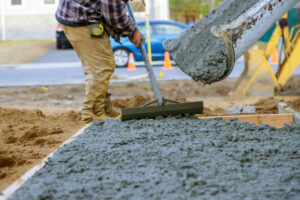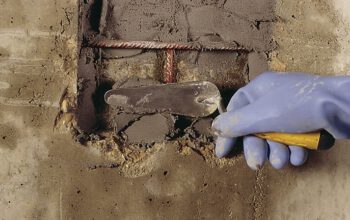Concrete Contractor Colorado Springs are responsible for the design, construction, and management of concrete structures. They often work on a construction team that includes architects, engineers, and general contractors.
The popular phrase “you don’t know a man until you walk a mile in his shoes” certainly applies to being a concrete contractor. When deciding on who to hire for your concrete project, consider the following qualities:
A concrete contractor must be able to provide high-quality results while working within budget. This requires a thorough knowledge of the construction process as well as the ability to work with concrete. A good concrete contractor is also familiar with local regulations. This includes obtaining the necessary permits for commercial projects. This can help prevent expensive delays down the road.
A good concrete contractor will be able to provide references from past clients and photos of completed projects. This will allow homeowners to determine whether or not the contractor can meet their needs. A quality concrete contractor will also be able to explain the benefits of using various materials and provide suggestions for additional services, such as staining or stamping.
The popular saying “you don’t know a man until you walk a mile in his shoes” applies to concrete contractors as well. It’s important to choose a contractor who has extensive experience in the industry. If possible, ask friends and family members for recommendations. This is a great way to gather a few concrete contractor options without spending much time or effort.
Once you’ve found a contractor that meets your requirements, it’s important to read their contracts carefully. Pay special attention to the payment schedules, warranties, and guarantees offered by the contractor. You should also ensure that they have the proper insurance coverage before hiring them. This should include liability, worker’s compensation, and company vehicle insurance.
If you’re interested in becoming a concrete contractor, you should start by developing a business plan. This will help you decide the goals, direction, and strategies of your business. You should also define your target market, such as residential or commercial construction.
In addition to having a business plan, you should have the proper insurance coverage. Liability and workers’ compensation insurance are both essential for any small business owner. You should also consider a professional umbrella policy to protect your personal assets.
In addition to the required licenses and insurance, you should have the right tools and equipment. A good concrete contractor should have a portable mixer, a concrete pump, hand-held power tools, and other professional equipment. You’ll also need a variety of cleaning and finishing tools, such as a shovel, tape measure, wheelbarrow, and broom.
Insurance
The insurance coverage that a concrete contractor has is vital to the success of their business. Without adequate coverage, hefty legal costs could put the business at risk of closure. As a result, many concrete contractors make getting the right type of insurance a top priority.
A good place to start is with general liability insurance. This policy protects the concrete contractor from damages or injuries caused by work performed on the job site. For instance, if a worker falls off a ladder while pouring concrete and is injured, the general liability insurance would pay for medical expenses and loss of income.
In addition to general liability insurance, a concrete contractor should have workers’ compensation insurance. This covers the cost of a worker’s lost wages, medical expenses, and funeral expenses in the event of an on-the-job injury. This is a mandatory type of insurance in most states, and it’s likely that your clients will require you to carry this coverage before they hire you for a job.
Another important type of insurance is commercial property insurance. This type of coverage pays to repair or replace a contractor’s equipment and materials in the event of a disaster. Examples of covered events include fire, flood, wind damage, and theft.
Concrete contractors use a lot of tools and machinery that are expensive to repair or replace. If these items are stolen or destroyed on the jobsite, this type of insurance can help them get back up and running quickly.
If a concrete contractor uses a company vehicle for business purposes, they need to have commercial auto insurance. This type of insurance protects the business from property damage, bodily injury, or liability claims that occur while driving a company vehicle.
Inland marine insurance is another policy that a concrete contractor should consider. This type of insurance protects tools and equipment that are in transit or storage between jobs. It also covers the value of a contractor’s inventory in the event of a disaster. If you need help determining what types of insurance are necessary for your concrete contracting business, contact an independent insurance agent. They can connect you with a provider that can tailor a package to meet your specific needs and budget.
License
A good concrete contractor will always have a license to perform work on your home or business. This will ensure that they are not cutting corners or using unlicensed workers on your project. In addition, it will protect you in case something goes wrong with your project. You should also ask a concrete contractor if they are insured and bonded. This will help you avoid any issues should they cause damage to your Omaha or Lincoln property.
Before becoming a concrete contractor, a person must gain experience in the field. Ideally, they should start out as laborers on a concrete crew. This will give them hands-on field experience and teach them the fundamentals of construction. After gaining some experience, they can move up the ranks to become a foreman managing a crew and schedule or a superintendent running multiple crews. This will help them understand the behind-the-scenes aspects of their job and how to maximize efficiency.
A concrete contractor has a unique set of skills that can take any residential or commercial construction design and make it a reality. They use their education, skills, and knowledge to create top-quality structures that are safe and structurally sound. Additionally, they are able to work with various stages of concrete—from the dry, premixed combination all the way to the hard-finished foundation we walk on every day.
It is important for a concrete contractor to have the right tools for the job. A quality contractor will have a variety of tools, including a concrete pump, formwork, concrete cutters, and shovels. The right tools will help them get the job done faster and more efficiently. This will also ensure that the final product is high-quality and durable.
Moreover, it is crucial for a concrete contractor to be knowledgeable of the required permitting process. A quality contractor will know what permits are needed for a particular project and how long it will take to obtain them. This will prevent them from committing any mistakes that could delay the completion of your project.
A reputable concrete contractor will keep up with the latest industry trends and advancements. They will be able to answer any questions you may have about the types of concrete or construction projects they can do for you. They should also be able to provide you with a timeline for when your project will be completed.
Warranty
Concrete construction is a messy job that requires a lot of equipment. When hiring a concrete contractor, ask them what they can offer in terms of warranties. If they only guarantee their work for a year, you might want to look elsewhere. A quality concrete contractor should be able to stand behind their work for at least three years or more.
A concrete contractor should be able to provide you with a warranty on their work that will cover any structural damage that may occur as a result of poor workmanship. The warranty should also include any repairs needed to fix the underlying issue that caused the structural damage. This is especially important if the concrete was not properly installed or if it was exposed to extreme weather conditions.
Another important thing to consider when choosing a concrete contractor is their ability to work efficiently and on schedule. Commercial construction projects often have strict deadlines and budgets, so it is crucial that the concrete contractor can meet these requirements. A good concrete contractor will have a team of experienced employees and a fleet of specialized equipment to ensure that the project is completed on time.
Some contractors will also offer a limited lifetime warranty on their work, but it is important to read the fine print before you hire one. A limited lifetime warranty usually excludes any damage caused by impact, exposure to salt or other deicer chemicals, ground settlement, accidents, homeowner repair attempts, and natural disasters.
A good concrete contractor will also be able to provide you with a detailed estimate for the work that needs to be done. This will help you decide if the contractor is worth hiring and give you an idea of how long the work will take. It is important to avoid contractors who promise unrealistic completion dates, as this will most likely lead to a delay in your project.
If a concrete contractor is offering a lifetime warranty on their concrete raising work, you should be wary of hiring them. The truth is that most concrete-raising jobs only have a one-year warranty. This is because the concrete will probably need to be relifted within a few months.



